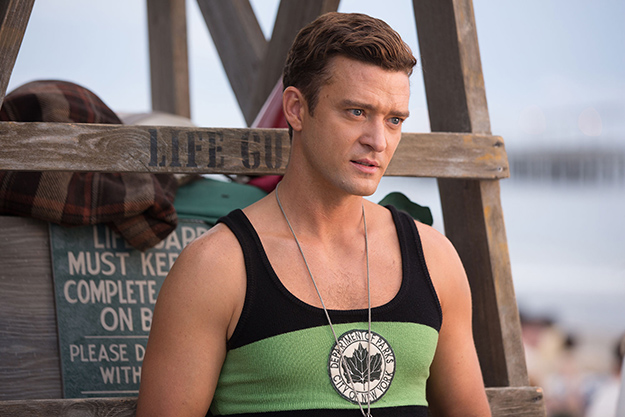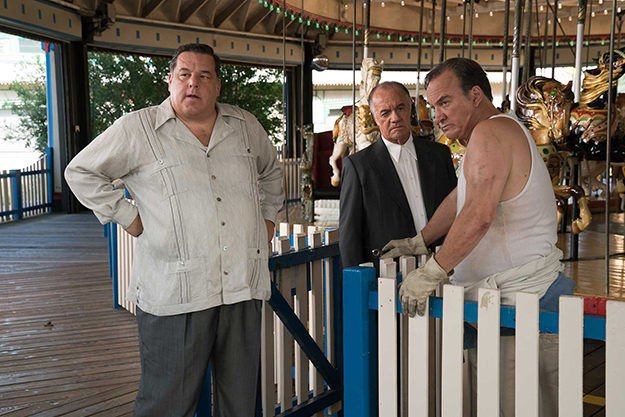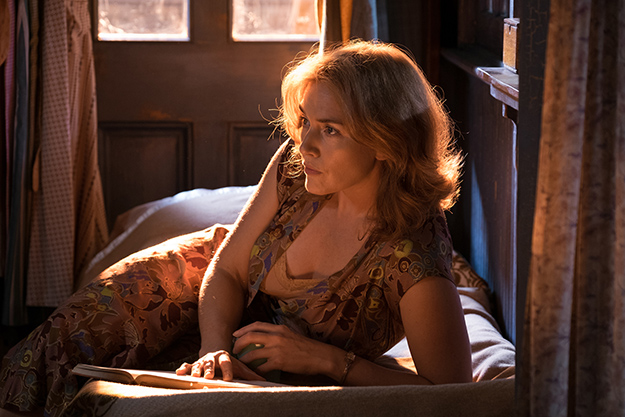At the start, ex-sailor, current graduate student, aspiring dramatist, and seasonal lifeguard Mickey Rubin (Justin Timberlake) announces from his lookout chair, “Coney Island, 1950s, the beach, the boardwalk.” In this era it’s a fraying urban dream spot that still attracts New Yorkers starved for a sea breeze, as well as tourists seeking “cheap thrills and great hot dogs.” But the story Rubin and his creator, Woody Allen, actually tell in Wonder Wheel reflects another Gotham fantasy zone: postwar Broadway, where serious playwrights like Tennessee Williams, Arthur Miller, William Inge, and that returning 1930s wunderkind, Clifford Odets, strive to craft first-class catharses and win critical and popular acclaim. Allen tries to spin a yarn connected to his roots in mid-century Brooklyn with the tools provided by these predecessors. At his own artistic peril, Allen attempts to mix first-hand experience and second-hand references, and he achieves a fascinating and frustrating near-miss. Talking straight to the camera, Mickey tells us that because he’s “poetic” by nature, he’s prone to symbolism, and because he’s a budding dramatist, he’s drawn to melodrama and “larger-than-life” characters. His admission prepares us for what follows, but it covers only a small portion of this movie’s influences. When Kate Winslet’s migraine-prone antiheroine Ginny, who waitresses at a clam joint, grouses about living on Coney Island in close quarters (an apartment that used to house a freak show and sits above a shooting gallery), her claustrophobic anger evokes Odets. When she waxes nostalgic for her days as a small-time stage actress or laments her reckless infidelity to her first husband (her true love), her florid melancholy suggests Williams. Her second marriage to a decent, burly lug named Humpty (James Belushi), a recovering alcoholic who operates the merry-go-round, recalls the simmering desperation of Inge’s married couples. (Ginny sometimes hits the bottle, too.) Timberlake’s Mickey molds and comments on the action like that other budding writer, Tom Wingfield, in Williams’s Glass Menagerie. He’s the family outsider and potential romantic savior—a not-so-gentlemanly-caller. Mickey gets drawn first to Ginny and then to Humpty’s grown daughter Carolina (Juno Temple), a luminous, sweet, naïve yet intelligent blonde who’s on the lam from her Mafia husband and his thugs. From the moment Carolina shows up, unannounced, her presence upsets the equilibrium in Humpty’s household. She elicits Humpty’s deepest affections (shades of the niece and uncle in Miller’s A View from the Bridge). Annoyed at Humpty’s insistence that being a waitress isn’t good enough for his daughter, Ginny finds herself increasingly at sea with her own problem child, Richie (Jack Gore), a movie-mad pyromaniac. (Allen himself was 14 in 1950, the year of Winchester 73, which is playing at a neighborhood movie house the characters pass by.) The pressures building on Ginny from her lover and her son, her husband and his daughter, culminate in a Miller-like moral crisis.
According to Eric Lax’s new book Start to Finish: Woody Allen and the Art of Moviemaking, Allen generally feels that a movie character speaking directly to the audience “distances you from the intense reality of it.” He also thinks that heightened stage language doesn’t play well on screen: “It’s film, so characters talk like people in real life; they’re not speaking poetically like Tennessee Williams writes because in my films that would sound artificial.” So Allen takes a couple of risks in Wonder Wheel, beginning the film with Rubin breaking the fourth wall, then peppering it with fervid dialogue and blatant dramatic devices. It’s as if he thought that having Mickey acknowledge the staginess of the piece would allow us to relax and enjoy it. To a limited extent, his hunch pays off. Mickey displays sublime fatuous wisdom when he explains the concept of the “tragic flaw” to Ginny—his own is that “I fall in love too easily”—before adding that tragedy also stems from destiny. Everything Mickey says explicates this movie. It’s mildly diverting to see the subplots click together as if Fate had set a trap for Ginny to reveal the worst side of herself. It’s as if Allen were playing a game called “Cause and Effect.” But when the writer-director has to sustain a flight of passion or imagination, the self-conscious structure he set up gets in the way. Some of Allen’s period patois and gaudy dialogue did tickle me. When a pal asks why Ginny doesn’t go fishing anymore, Humpty says she only pretended to like it: “It kept me on the hook, I was the fish.” Not all of Allen’s influences here are stage-bound. “Everybody dies,” Carolina tells Mickey, repeating John Garfield’s famous line from Abraham Polonsky’s Force of Evil (1948). At times we chuckle when Allen pitches domestic arguments on the edge of parody. Ginny tells Carolina, “When you’re married to a man who got rich putting people’s feet in cement, you probably never had to wash a dish!” But too often, Allen undermines his own love for heated arguments and melodrama with rue and sarcastic wit. Early on, Ginny admits she was contemplating drowning herself, but lifeguard Mickey would have ruined her “grand finale.” Later, when Mickey tells Ginny, “I know what it is you did,” she asks, “Don’t you think you’re being a little melodramatic?” The closest this film comes to an epiphany is when Ginny declares that she isn’t a waitress, she’s merely playing the role of a waitress. It’s fun to hear Ginny refer to the George S. Kaufman–Marc Connelly comedy Dulcy and the Gershwin musical Oh, Kay! They bring back a bygone repertoire. She thinks she remembers playing a whore in O’Neill and acting in Chekhov (in Baltimore!); she did fall into an affair with a beautiful young actor playing Marchbanks in Shaw’s Candida. But Allen doesn’t indicate that she was an up-and-comer. He gives her an actor’s résumé, not an actor’s temperament: she lacks imaginative resources. Winslet is cumulatively affecting, but she tries to plumb depths that aren’t there. We respond to her blood, sweat, toil, and tears, more than we do to the supposed complexities of her character. Everyone does what they can within strict limits. I liked the way Belushi resembled big old bullying man-stars like Broderick Crawford, who starred in the 1950 film version of Born Yesterday, one of Allen’s favorite comedies. (In fact, Belushi played the Crawford role in the play’s 2011 revival.) Temple has a sadness-streaked bloom as Carolina, and Timberlake brings his own confidence and precision to Mickey’s patter. Just as Ginny is less a has-been than a never-was, Mickey is destined to be a playwright manqué. For a while, it’s a kick to hear Timberlake find the music in Allen’s familiar rhythms, even if the script won’t allow him to flesh out the speaker. He remains an underwritten would-be writer.
Cinematographer Vittorio Storaro and production designer Santo Loquasto make this film look and feel both real and surreal. Watching it gave me a sense-memory of playing with brightly painted ’50s tin-toys in unevenly lit recreation rooms. The creative team conjures a saturated, primary-colored palette that’s also extremely sensitive to where red shades into orange or blue into aqua. Loquasto arranges the apartment so that the boardwalk lights are always creeping through the windows, giving Storaro the chance to design lighting as “moody” as Ginny. These talents make it easy to relax into this film, but we drift out of it just as easily. Filled with images of a Ferris wheel and a merry-go-round, Wonder Wheel leaves us with the jangly notion that people simply go around the same old circuit themselves. Ginny sabotages her better impulses, Humpty uses liquor to cushion his emotional crashes, and little Richie can express himself only by setting fires. The plot and the structure undercut the affection Allen has for his salt-of-the-seaside characters. The writer-director falls in love with a tidy narrative arc that ends up more like a vicious circle. Michael Sragow is a contributing editor to Film Comment and writes its Deep Focus column. He is a member of the National Society of Film Critics and the Los Angeles Film Critics Association, and a programmer at the Criterion Collection.


